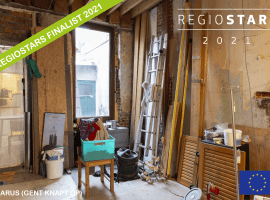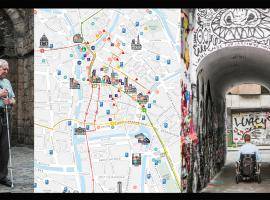Ghent knap Op celebrates the end of a successful innovative project on upgrading and renovating homes of vulnerable citizens 'captive owners'. Although the past two years have been very challenging, with Covid, lockdowns and rising constructions prices, Ghent knap Op achieved 82 housing renovations that upgraded poor quality housing into liveable, healthy and energy efficient homes.
This project provides the answer to the lack of affordable and accessible housing in the City of Ghent. Social housing is limited with long waiting lists and the private rental market unaffordable, small and of poor quality. Homeownership is common in Ghent, as loan charges have been quite low in the past, and many lower income citizens went to great lengths to buy a house which in most cases were in very poor conditions. These homeowners are called ‘captive’ as they are stranded within a difficult situation of very poor living conditions.
Captive owners with limited disposable income and homes that lacked basic living quality and energy standards took part in this pilot project that also supported them socially through this process. Ghent knap op helped them to take on their renovation by becoming an integral part of the process and therefore improved their self-esteem, self-reliance and social network. Related to this is the fact that 20% of the participants (almost) never had social contacts in their house, but now 37% of the homeowners expect to have more social contacts
“If we don’t support those people who already have a house, they will eventually be forced to sell their houses and end up on the private rental market or the waiting lists for social housing. Through this initiative, we are trying to prevent this from happening.” Derkien De Baets, Project Manager Ghent Knapt Op
A multi-disciplinary group of partners, The City of Ghent, the Public Center of Social Welfare, SAAMO Gent, vzw Sivi, REGent vzw, Domus Mundi vzw, the Catholic University of Leuven, the Ghent University and AP University of Applied Sciences and Arts came together to take on the challenging task of testing this pilot, which successfully concluded in June 2022 with a series of exhibitions and celebrations.
After three years, 82 houses upgraded in different neighbourhoods in the city of Ghent and 82 families changed their lives. Ghent Knapt Op introduces the concept of co-design to participants as part of the renovation process while supporting them technically, financially and emotionally. With the help of social workers from the Public Center of Social Welfare (PCSW) and experienced non-profit partners such as SAAMO Gent and Vzw Sivi, Ghent Knapt Op has provided social support and community engagement during the three-year project. The crucial part of the project is the use of a recurring fund. This fund allows homeowners to finance the renovations nwo and in the future.

The results;
Ghent knap Ops housing renovations focused on transforming poor homes to become safer and more energy-efficient according to the Flemish Building code. The results had a two-tier performance indicator;
Technically: The most common upgrades were: roof insulation (+/- 60%), new windows or doors (+/- 60%), a new heating system (+/- 50%) or an update of the electric system (+/- 80%). Consequently, these works made a substantial improvement to living quality but also energy efficiency. All homes according to the ‘Energy Performance Certificate’ improved their energy performance from an ‘E-label’ to a ‘C-label’.
Livelihoods: There was a significant impact on the participants’ lives as the houses transformed. The impact studies organised by the research consortium indicate improvements in several areas. After renovation, there was a strong increase in the proportion of residents who are now very happy to be at home, from 49% before the renovation to 81% after the renovation. The overall satisfaction about their house also increased. We can also see that the state of the house improved their self-esteem and confidence.




























